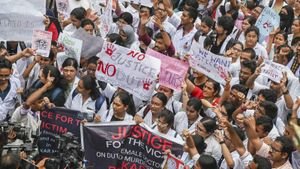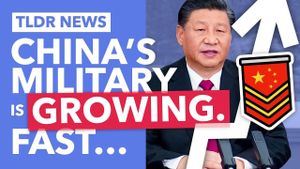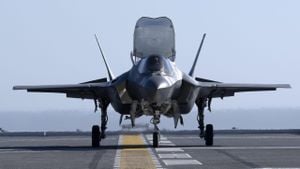On the solemn occasion of Sardar Vallabhbhai Patel's birth anniversary, Indian leaders have echoed sentiments of unity and national integrity, taking cues from the legacy of the revered leader. This year, as festivities for Diwali unfolded, various political figures across the country utilized the dual significance of the day to reflect on unity, development, and the ethos imparted by the dynamic leader known as the Iron Man of India.
Rajasthan’s Chief Minister Bhajan Lal Sharma led the commemorations by paying floral tributes at his residence, emphasizing Patel's role as the architect of modern India and the keystone of the nation’s unity. "Sardar Vallabhbhai Patel’s determination to unite the country post-independence inspires us all," he stated, capturing the essence of Patel’s vision for India.
Sharma acknowledged Prime Minister Narendra Modi’s initiative to observe Patel’s birthday as National Unity Day, highlighting the ‘Ek Bharat-Shreshtha Bharat’ initiative aimed at promoting unity across the nation. The Chief Minister also participated actively by flagging off the ‘Run For Unity’ marathon, embodying the spirit of national integration. He pointed out how the marathon sends out the message of diversity within unity, drawing parallels with the grand Statue of Unity erected to honor Patel’s enduring legacy.
Meanwhile, Haryana Chief Minister, Nayab Singh Saini, joined the chorus of leaders lauding Patel’s contributions. Speaking at the ‘Run for Unity’ event held at Kurukshetra, he called for collective responsibility among the citizens toward realizing Prime Minister Modi’s vision for transforming India by 2047. "Observers across the globe should hear the message of unity echo from the historic land of Kurukshetra," Saini urged, framing Patel as both visionary and unifying force capable of merging over 500 princely states after independence, reflecting his exceptional leadership qualities.
Other regions, like Bengaluru, saw Congress party members led by National President Mallikarjun Kharge paying respects to patron leaders, including Patel and former Prime Minister Indira Gandhi. Kharge’s actions signified bipartisan acknowledgment of Patel’s foundational role in India’s formation and political unity.
Traditions ran deep as Diwali celebrations continued across the nation. While tributes flew from political platforms, the festival itself stood as proof of the festive spirit, juxtaposed against tributes to national icons. Streets filled with people, purchasing flowers and decorations, depicted the joyous ambiance typical of the season. Cities like Nagpur were buzzing, showcasing vibrant markets as locals stopped by to decorate their homes, merging cultural festivities with national pride.
Across various celebrations, moments of reflective unity were observed. For example, Indian and Chinese army personnel shared sweets on this auspicious occasion, embodying the true spirit of brotherhood even when faced with political tensions. It demonstrated the day’s broader theme of striving for unity.
Patel’s contributions went beyond mere political framework; they inspired citizens to take cues from his spirit and act as beacons of hope and integrity. Various leaders articulated the urgency to embody these ideals today, reinforcing messages of peace and community development. With October 31 marking both Diwali and the National Unity Day, the reminders from the leadership have coupled festive joy with patriotic fervor, urging citizens to integrate these ideals deeply within their communities.
This duality of celebration—marked by lights of Diwali and reflections on Patel's legacy—creates a powerful narrative emphasizing hope, unity, and national integrity. Such initiatives and observances resonate through the actions of the people, demanding not just remembrance but continuous commitment to the ideals Patel fought for.
Such events remind India’s citizens, young and old, to articulate and uphold the values etched deep within the nation’s fabric, drawing parallels to the vast diversity woven throughout the country. The intersection of tradition, patriotism, and reflective celebrations manifests the message: unity is not just necessary; it is the cornerstone of India’s enduring identity.



